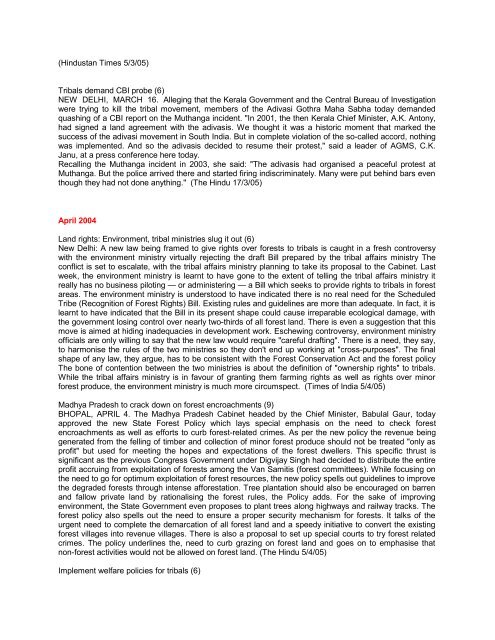Create successful ePaper yourself
Turn your PDF publications into a flip-book with our unique Google optimized e-Paper software.
(Hindustan Times 5/3/05)<br />
Tribals demand CBI probe (6)<br />
NEW DELHI, MARCH 16. Alleging that the Kerala Government and the Central Bureau of Investigation<br />
were trying to kill the tribal movement, members of the Adivasi Gothra Maha Sabha today demanded<br />
quashing of a CBI report on the Muthanga incident. "In 2001, the then Kerala Chief Minister, A.K. Antony,<br />
had signed a land agreement with the adivasis. We thought it was a historic moment that marked the<br />
success of the adivasi movement in South India. But in complete violation of the so-called accord, nothing<br />
was implemented. And so the adivasis decided to resume their protest," said a leader of AGMS, C.K.<br />
Janu, at a press conference here today.<br />
Recalling the Muthanga incident in 2003, she said: "The adivasis had organised a peaceful protest at<br />
Muthanga. But the police arrived there and started firing indiscriminately. Many were put behind bars even<br />
though they had not done anything." (The Hindu 17/3/05)<br />
April 2004<br />
Land rights: Environment, tribal ministries slug it out (6)<br />
New Delhi: A new law being framed to give rights over forests to tribals is caught in a fresh controversy<br />
with the environment ministry virtually rejecting the draft Bill prepared by the tribal affairs ministry The<br />
conflict is set to escalate, with the tribal affairs ministry planning to take its proposal to the Cabinet. Last<br />
week, the environment ministry is learnt to have gone to the extent of telling the tribal affairs ministry it<br />
really has no business piloting — or administering — a Bill which seeks to provide rights to tribals in forest<br />
areas. The environment ministry is understood to have indicated there is no real need for the Scheduled<br />
Tribe (Recognition of Forest Rights) Bill. Existing rules and guidelines are more than adequate. In fact, it is<br />
learnt to have indicated that the Bill in its present shape could cause irreparable ecological damage, with<br />
the government losing control over nearly two-thirds of all forest land. There is even a suggestion that this<br />
move is aimed at hiding inadequacies in development work. Eschewing controversy, environment ministry<br />
officials are only willing to say that the new law would require "careful drafting". There is a need, they say,<br />
to harmonise the rules of the two ministries so they don't end up working at "cross-purposes". The final<br />
shape of any law, they argue, has to be consistent with the Forest Conservation Act and the forest policy<br />
The bone of contention between the two ministries is about the definition of "ownership rights" to tribals.<br />
While the tribal affairs ministry is in favour of granting them farming rights as well as rights over minor<br />
forest produce, the environment ministry is much more circumspect. (Times of India 5/4/05)<br />
Madhya Pradesh to crack down on forest encroachments (9)<br />
BHOPAL, APRIL 4. The Madhya Pradesh Cabinet headed by the Chief Minister, Babulal Gaur, today<br />
approved the new State Forest Policy which lays special emphasis on the need to check forest<br />
encroachments as well as efforts to curb forest-related crimes. As per the new policy the revenue being<br />
generated from the felling of timber and collection of minor forest produce should not be treated "only as<br />
profit" but used for meeting the hopes and expectations of the forest dwellers. This specific thrust is<br />
significant as the previous Congress Government under Digvijay Singh had decided to distribute the entire<br />
profit accruing from exploitation of forests among the Van Samitis (forest committees). While focusing on<br />
the need to go for optimum exploitation of forest resources, the new policy spells out guidelines to improve<br />
the degraded forests through intense afforestation. Tree plantation should also be encouraged on barren<br />
and fallow private land by rationalising the forest rules, the Policy adds. For the sake of improving<br />
environment, the State Government even proposes to plant trees along highways and railway tracks. The<br />
forest policy also spells out the need to ensure a proper security mechanism for forests. It talks of the<br />
urgent need to complete the demarcation of all forest land and a speedy initiative to convert the existing<br />
forest villages into revenue villages. There is also a proposal to set up special courts to try forest related<br />
crimes. The policy underlines the, need to curb grazing on forest land and goes on to emphasise that<br />
non-forest activities would not be allowed on forest land. (The Hindu 5/4/05)<br />
Implement welfare policies for tribals (6)

















